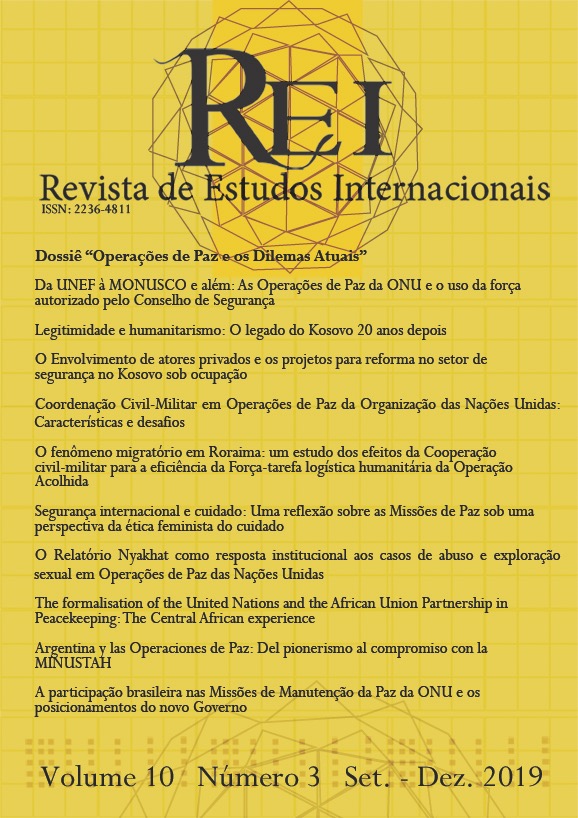LEGITIMIDADE E HUMANITARISMO: O LEGADO DO KOSOVO 20 ANOS DEPOIS
Palavras-chave:
Intervenções Humanitárias, Kosovo, Legitimidade InternacionalResumo
A intervenção no Kosovo pela Organização do Tratado do Atlântico Norte(OTAN) (1999), à revelia do Conselho de Segurança das Nações Unidas(CSNU), marcou um intensodebate sobre intervenções humanitárias como promotoras de direitos humanos econtigenciadoras de conflitos. Na ocasião, o tema da legitimidade internacional foi levantado por questionamentossubstantivos e procedimentais do regime de segurança. Para esta análise, este texto divide-se em três seções a fim de contextualizar a operação no Kosovo (1),discutir o escopo da legitimidade internacional (2) e refletir sobre o legado deste evento (3). Conclui-se que o episódio deixou importante herança para a fase seguinte do humanitarismo, sedimentando a noção de legitimidade no campo de proteção de civis e ensejando a reiteraçãoda autoridade do CSNU, a partir de instrumentos com retórica protetiva.
Referências
ADAMSON, Fiona B. (2016) Spaces of Global Security: beyond methodological nationalism.
Journal of Global Security Studies, 1(1): 19-35.
CHERSTERMAN, Simon. (2005) You, the people: the United Nations, transitional
administration, and state-building. Oxford: Oxford University Press on Demand.
______.. (2009) ‘I’ll Take Manhattan’: The International Rule of Law and the United Nations
Security Council. Hague Journal on the Rule of Law, 1(1): 67-73.
CHINKIN, Christine; KALDOR, Mary.(2017) International Law and New Wars. Cambridge:
Cambridge University Press.
CLARK, Howard. (2000) Civil Resistance in Kosovo.London: Pluto.
CLARK, Ian.(2005) Legitimacy in international society. Oxford: Oxford University Press on
Demand.
COHEN, Jean L. (2012) Globalization and sovereignty: Rethinking legality, legitimacy, and
constitutionalism. Cambridge: Cambridge University Press.
DEMBINSKI, Matthias; GROMES, Thorsten; WERNER, Theresa. (2019) Humanitarian Military
Interventions: conceptual controversies and their consequences for comparative research.
International Peacekeeping, 1-25.
DUFFIELD, Mark. (2001)Global Governance and New Wars: merging security and
development. London, New York: Zed Books.
FALK, Richard. (2012) Legality and legitimacy: necessities and problematics of exceptionalism.
InFALK, R.; JUERGENSMEYER, M.; POPOVSKI, V. (ed.). Legality and legitimacy in global
affairs.New York: OUP USA, 03-43.
GADDIS, John L. (2003) Order vs Justice: an American foreign policy dilemma. In FOOT,
Rosemary; GADDIS, John; Andrew HURRELL.Order and Justice in International Relations.
Oxford: Oxford University Press, 155-175.
HOSMER, Stephen. (2001) The conflict over Kosovo: why Milosevic decided to settle when he
did. Santa Monica: Rand Corporation.
HULTMAN, Lisa. (2012) UN peace operations and protection of civilians: cheap talk or norm
implementation? Journal of Peace Research, 50(1): 59-73.
HURRELL, Andrew. (2005) Legitimacy and the use of force: can the circle be squared? Review of
International Studies, 31(s/n): 15-32.
ICISS.International Commission on Intervention and State Sovereignty (2001).The Responsibility
to Protect.Otawa (Canadá): International Development Research Centre.
IMERMAN, Dane. (2018)Contested legitimacy and institutional change: unpacking the dynamics
of institutional legitimacy. International Studies Review, 20(1): 74-100.
JACOB, Cecilia. (2019) Atrocity Prevention and R2P: a responsive regulatory approach.
InInternational Studies Association’s 60th Annual Convention. Toronto (Canadá): International
Studies Association.
JUBILUT, Liliana L. (2010) Não intervenção e Legitimidade Internacional. São Paulo: Editora
Saraiva.
KALDOR, Mary. (2001)A decade of Humanitarian Intervention: The Role of Global Civil Society.
In ANHEIER, Helmut; GLASIUS, Marlies; KALDOR, Mary (ed). Global Civil Society 2001.
Oxford: Oxford University Press, 109-143.
______. (2012)New and Old Wars: organized violence in a global era. 3rd ed. Redwood City:
Stanford University Press.
______. (2018) Global Security Cultures. Cambridge: Polity Press.
KENNEDY, David. (2004) The Dark Sides of Virtue: reassessing international
humanitarianism. Princeton: Princeton University Press.
LINDGREN ALVES, José A. (2002)O Contrário dos Direitos Humanos.Lua Nova, s/v(55-56):
-132.
MACFARLANE, S. Neil; KHONG, Yuen F. (2006) Human Security and the UN: a critical
history. Bloomington: Indiana University Press.
NOGUEIRA, Arthur H. V. (2015)Kôssovo: província ou país?Brasília: Fundação Alexandre de
Gusmão.
ORFORD, Anne. (2003)Reading humanitarian intervention: human rights and the use of force
in International Law. Cambridge: Cambridge University Press.
______. (2011) International Authority and the Responsibility to Protect.Cambridge:
Cambridge University Press.
O ESTADO DE SÃO PAULO. (1999) OTAN bombardeia alvos estratégicos na Sérvia: Clinton e
Solana defendem operação militar e atribuem-na à resistência do líder iugoslavo. 25 de março de
, p.A16. Publicado em [https://acervo.estadao.com.br/pagina/#!/19990325-38509-nac-0016-
int-a16-not ]. Disponibilidade: 07/10/2019.
PADRÓS, Enrique S. (1999) Kosovo, a desintegração do mosaico iugoslavo.Revistas eletrônicas
FEE, 27(2): 137-150.
PECEQUILO, Cristina S. (2013)Os Estados Unidos e o Século XXI. Rio de Janeiro: Elsevier.
SEAMAN, Kate. (2014)UN-Tied Nations: the United Nations, Peacekeeping and Global
Governance. Surrey: Ashgate Publishing.
VISOKA, Gëzim; RICHMOND, Oliver. (2017) After liberal peace? From failed state-building to
emancipatory peace in Kosovo. International Studies Perspectives, 18(1): 110-129.
VIZENTINI, Paulo F. (1999) A fragmentação da Iugoslávia: paradigma da afirmação das estruturas
hegemônicas de poder.Revistas eletrônicas FEE,27(2):124-136.


